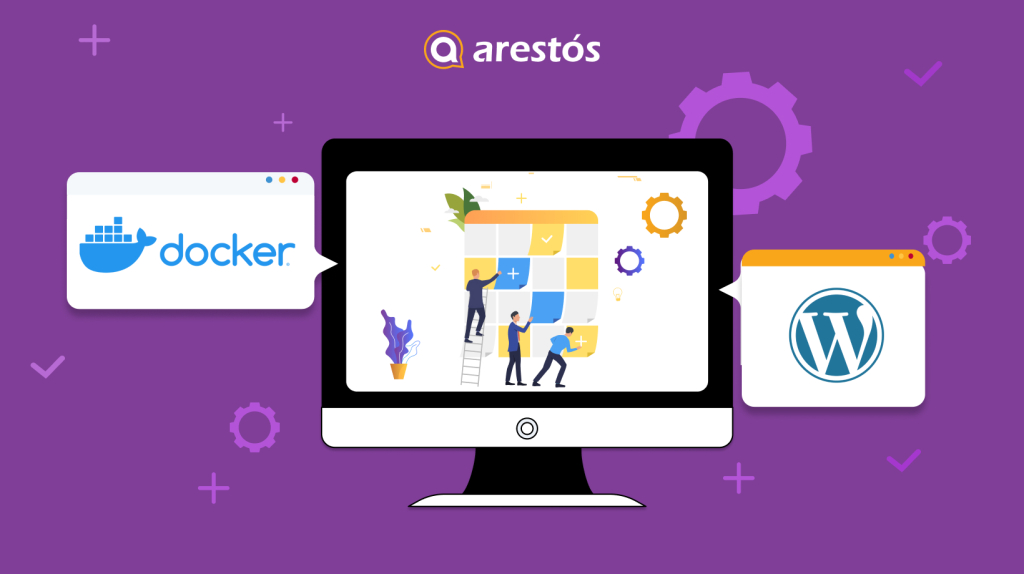Optimizing Your WordPress with Docker: A Step-by-Step Guide
In the world of WordPress development, staying up-to-date with the latest trends and technologies is crucial for maintaining a competitive edge. One technology that has been gaining significant traction in recent years is Docker. In this comprehensive overview, we will explore the benefits of running WordPress with Docker and its impact on WordPress development. By optimizing your WordPress site with Docker, you can unlock a world of possibilities for improved efficiency, resource management, security, and collaboration.
In the world of WordPress (WP) development, staying up-to-date with the latest trends and technologies is crucial for maintaining a competitive edge. One technology that has been gaining significant traction in recent years is Docker. In this comprehensive overview, we will explore the benefits of running WordPress with Docker and its impact on WordPress development.
By optimizing your WordPress site with Docker, you can unlock a world of possibilities for improved efficiency, resource management, security, and collaboration. So, let’s dive into this comprehensive overview of the benefits of running WordPress with Docker and discover how it can transform your WordPress development experience.

Understanding Docker and Its Role in WordPress
Provide a brief overview of Docker and containerization
When it comes to modern software development and deployment, Docker has emerged as a leading technology. Docker is an open-source platform that enables containerization, a lightweight virtualization method that allows applications to run in isolated environments called containers. These containers package the application and its dependencies into a single, portable unit, making it easier to deploy and manage across different systems.
How Docker works and its benefits for software deployment
Docker operates based on the principle of using container images, which are read-only templates containing everything needed to run a specific application or service. These images can be pulled from public or private repositories, providing a vast library of pre-configured environments to work with.
By utilizing Docker, developers can ensure consistent and reproducible software deployments. Docker’s containerization eliminates compatibility issues by bundling the application with all its dependencies, including libraries, frameworks, and even the operating system. This eliminates the “it works on my machine” problem and streamlines the deployment process.
Why Docker is well-suited for running WordPress
Docker is exceptionally well-suited for running WordPress due to its lightweight and portable nature. By containerizing WordPress with Docker, you can encapsulate the entire WordPress stack, including the web server, database, and necessary dependencies, into a single container. This approach offers several advantages:
Isolation: Docker containers provide isolation, ensuring that changes made to one container do not affect others. This allows for more robust and secure WordPress installations.
Portability: Docker containers are highly portable, making it easy to run WordPress consistently across various environments, such as local development machines, staging servers, or cloud hosting providers.
Scalability: Docker enables easy scaling of WordPress sites by allowing you to replicate containers based on demand. With Docker’s orchestration tools, such as Docker Swarm or Kubernetes, you can effortlessly scale your WordPress infrastructure up or down.
Simplified Development and Deployment
How Docker simplifies the development process for WordPress
Developing WordPress sites can be a complex and time-consuming task. However, Docker simplifies the development process by providing a streamlined and consistent environment. With Docker, developers can create Docker images that contain the necessary components for running WordPress, such as PHP, MySQL, and web servers like Nginx or Apache. These images can be easily shared, ensuring that everyone on the development team is working with the same configuration.
The advantages of using Docker for consistent local development environments
One of the significant advantages of using Docker for WordPress development is the ability to create consistent local development environments. Docker allows developers to define the exact dependencies and configurations needed for their WordPress projects, ensuring that each team member has an identical setup. This consistency minimizes the “works on my machine” problem and facilitates collaboration, as everyone is working in the same environment.
The ease of deploying WordPress with Docker across different environments
Deploying WordPress sites to different environments, such as staging or production servers, can be a daunting task. However, Docker simplifies this process by providing a standardized deployment approach. Once the Docker image is created and tested locally, it can be easily deployed to various environments, including cloud platforms like AWS, Azure, or Google Cloud, with minimal configuration changes. Docker’s portability and containerization make it effortless to ensure consistent deployments across different hosting providers or infrastructure setups.
See more articles: WordPress vs Wix: Which one you should choose 2023?
Scalability and Resource Efficiency
Explore how Docker enables scalability for WordPress sites
Scalability is a critical factor for any successful WordPress site, especially as traffic and demand increase. Docker provides an excellent solution for scaling WordPress sites efficiently. With Docker, you can easily replicate containers to handle increased traffic or resource demands. Docker’s orchestration tools, such as Docker Swarm or Kubernetes, allow you to manage multiple containers and automatically distribute the workload across them, ensuring optimal performance and availability.
The benefits of containerization for resource management and efficiency
Containerization, a core feature of Docker, offers significant benefits for resource management and efficiency in WordPress. Docker containers allow you to isolate different components of your WordPress stack, such as the web server, database, and caching layers. By separating these components into individual containers, you can allocate resources more effectively, optimize performance, and avoid resource conflicts. This granular control over resource allocation ensures that your WordPress site runs smoothly and efficiently, even during peak traffic periods.
How Docker makes it easier to scale WordPress based on traffic demands
One of the advantages of Docker is its ability to scale WordPress sites quickly and efficiently based on traffic demands. With traditional hosting setups, scaling a WordPress site often involves manual configuration changes and downtime. However, Docker simplifies the process by allowing you to replicate containers as needed. When traffic increases, Docker enables you to easily create additional containers to handle the load. Likewise, when traffic decreases, you can scale down by removing unnecessary containers. This dynamic scaling capability ensures that your WordPress site can adapt to fluctuating traffic demands without compromising performance or incurring downtime.
Isolation and Security
The importance of isolation for WordPress security
Security is a top concern for any WordPress site owner. Isolation plays a crucial role in enhancing WordPress security by preventing malicious code or vulnerabilities from affecting the entire system. With Docker, each component of your WordPress site, such as the web server, database, and plugins, can run in separate containers. This isolation ensures that if one container is compromised, the rest of the system remains unaffected, significantly reducing the potential impact of security breaches.
How Docker containers provide isolation for WordPress sites
Docker containers provide a lightweight and efficient form of isolation for WordPress sites. Each container encapsulates a specific component or service required by WordPress, such as Apache or MySQL, with its dependencies. This isolation prevents conflicts between components and minimizes the attack surface. Additionally, Docker allows you to set resource limits and access controls for each container, further enhancing the security of your WordPress environment.
The benefits of running WordPress in a containerized environment for enhanced security
Running WordPress in a containerized environment offers several benefits for enhanced security. Firstly, containerization allows you to isolate and secure individual components, reducing the likelihood of vulnerabilities spreading across your WordPress stack. Secondly, Docker provides robust tools for image scanning, vulnerability assessments, and automated updates, ensuring that you can promptly address any security issues. Lastly, the ability to easily rebuild and replace containers provides a valuable recovery option in case of security incidents or compromised components.
Flexibility and Portability
The flexibility Docker brings to WordPress development
Docker brings a new level of flexibility to WordPress development. With Docker, you can define and version your entire WP environment as code, making it easy to reproduce and share across different stages of development. Docker allows developers to create custom images that include specific configurations, plugins, and themes, enabling consistent development environments and facilitating collaboration among team members.
The portability of Docker containers and their compatibility across different platforms
Docker containers are highly portable, making them compatible with various platforms and operating systems. Once you have created a Docker image for your WordPress site, it can be deployed on any system that supports Docker, such as Linux, macOS, or Windows. This portability eliminates platform-specific issues and allows for seamless migration between different hosting providers or infrastructure setups.
How Docker simplifies the migration of WordPress sites between hosting providers
Migrating WordPress sites between hosting providers can be a challenging task. However, Docker simplifies this process by encapsulating the entire WP environment in a container. You can package your WordPress site, including the code, database, and dependencies, into a Docker image. This image can be easily moved and deployed to different hosting providers without the need to manually configure the server environment. Docker’s portability and standardized deployment approach make migrating WordPress sites a seamless and efficient process.
Streamlined Collaboration and Version Control
How Docker facilitates collaboration among developers working on WordPress projects
Collaboration is crucial in WordPress development, and Docker provides an excellent framework for streamlined collaboration. With Docker, developers can define the project’s entire environment in a Dockerfile, including dependencies, plugins, and configurations. This allows team members to work in a consistent and reproducible environment, reducing compatibility issues and ensuring everyone is on the same page. Docker’s containerization also makes it easy to share development environments, enabling seamless collaboration and faster onboarding for new team members.
The advantages of version controlling Docker configurations for WordPress sites
Version controlling Docker configurations for WordPress sites brings numerous advantages. By managing the Dockerfile and associated configuration files in a version control system like Git, you can track changes, roll back to previous configurations if needed, and collaborate effectively. Version control allows for better documentation of changes, encourages best practices, and enables easy replication of the development environment across different stages of the project. It also provides a solid foundation for continuous integration and deployment workflows.
How Docker improves team productivity and project management
Docker improves team productivity and project management by streamlining development workflows. Docker’s containerization eliminates the need for complex setup instructions and reduces the time spent on environment configuration. Developers can quickly spin up containers with the required configurations, libraries, and plugins, allowing them to focus on writing code rather than troubleshooting environment-related issues. Additionally, Docker enables project managers to create standardized development environments and ensures consistent testing and deployment processes, leading to increased efficiency and smoother project execution.
Ecosystem and Community Support
The thriving Docker ecosystem and community resources available for WordPress
Docker has a thriving ecosystem with a wealth of community resources available specifically for WordPress. From tutorials, forums, and blogs to official documentation and community-contributed content, there is a wealth of knowledge and support available. The Docker community is active and engaged, providing valuable insights, tips, and solutions for running WP with Docker. Engaging with the Docker community can help developers stay updated with the latest trends, best practices, and emerging tools.
Popular Docker tools and plugins specifically designed for WordPress
Several popular Docker tools and plugins are specifically designed to enhance WordPress development workflows. For example, Docker Compose simplifies the management of multi-container setups, allowing you to define and orchestrate the entire WordPress stack. Additionally, plugins like WordOps or Trellis integrate Docker with popular WordPress development frameworks, providing a seamless and optimized environment for WP site development.
Examples of community-contributed Docker images and configurations for WordPress
The Docker community has contributed numerous Docker images and configurations tailored for WP. These community-contributed resources provide ready-to-use containers for popular WordPress setups, such as Nginx, Apache, or MariaDB. These images and configurations are continuously updated and maintained by the community, ensuring compatibility with the latest versions of WordPress and other related tools. Leveraging these community-contributed resources can significantly speed up the setup process and reduce the chances of configuration errors.
Conclusion
In conclusion, running WordPress with Docker offers a multitude of benefits that can revolutionize your development and deployment workflows. As you embark on your WordPress journey, Arestos encourage you to explore the power of Docker. The Docker ecosystem offers extensive community support, tools, and resources specifically tailored for WP development. Engage with the vibrant Docker community, experiment with Docker Compose, and leverage community-contributed images and configurations to enhance your WP projects. With Arestós, we’re here to support your. Visit our website to learn more about our services.



